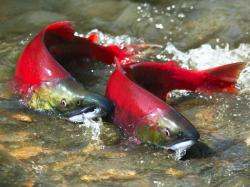Report: Sockeye Salmon Prices Forecasted To Skyrocket
July 8, 2015 | 3 min to read

VANCOUVER, BRITISH COLUMBIA – Climate change could contribute to an increase of more than 70 per cent in the price per pound of B.C.'s iconic sockeye salmon by 2050, says a new report commissioned by Vancity credit union.
The Vancity report, Out of Stock: the impact of climate change on British Columbia's staple seafood supply and prices is authored by internationally renowned UBC professor, Dr. Rashid Sumaila, and UBC postdoctoral fellow Vicky Lam. The authors found that by 2050, seven of B.C.'s 10 staple species – the ones British Columbians spend the most on – will likely decline. Under the warming scenarios examined, sockeye salmon has the highest potential decrease in catch at 21 per cent.
The report also finds that by 2050:
- British Columbians could also see a 10-per-cent decline in chum salmon and a 15-per-cent decline in sablefish catch;
- The net increase in cost to B.C. consumers for our 10 staple seafood species – including sockeye, chum, halibut, tuna and sablefish – could reach up to $110 million a year (2015 dollars);
- In addition to other factors adding pressures to seafood prices, climate change alone is projected to add increases of up to $1.33, $0.77 and $0.64 per pound for sockeye, chum and sablefish, respectively;
- Climate change is just one of the factors contributing to the projected increase in retail fish prices;
- Statistics Canada found retail fish prices increased more than 38 per cent over the past five years without factoring in climate change impacts.
Changes in ocean physics and chemistry brought on by climate change, specifically carbon dioxide (CO2) emissions are already impacting key marine and coastal organisms, ecosystems, and the services they provide us, including seafood. The report commissioned by Vancity makes several recommendations for action.
Dr. Sumaila will discuss the report findings along with a panel of esteemed speakers including chef Ned Bell at a public event hosted by Vancity on Wednesday, July 8, 2015, at Science World. Vancity encourages the public to attend to discuss possible solutions and how British Columbians can contribute to mitigating and adapting to climate change. The event runs from 6 to 7:30 p.m. and costs $10, with all proceeds going to Chefs for Oceans. Visit vancity.com/events for full details and to register.
Vancity is involved in a wide number of environmental initiatives to help reduce climate change and build healthy communities. This includes investing in local and organic food initiatives including sustainable seafood, fisheries and ocean health.
Additional information:
- Report: Out of Stock: the impact of climate change on British Columbia's staple seafood supply and prices
- Backgrounders: Vancity's investment in environmental sustainability, and in sustainable seafood, fisheries & ocean health
About Vancity
Vancity is a values-based financial co-operative serving the needs of its more than 509,000 member-owners and their communities through 59 branches in Metro Vancouver, the Fraser Valley, Victoria, Squamish and Alert Bay. As Canada's largest community credit union, Vancity uses its $18.6 billion in assets to help improve the financial well-being of its members while at the same time helping to develop healthy communities that are socially, economically and environmentally sustainable.
Source: Vancity
